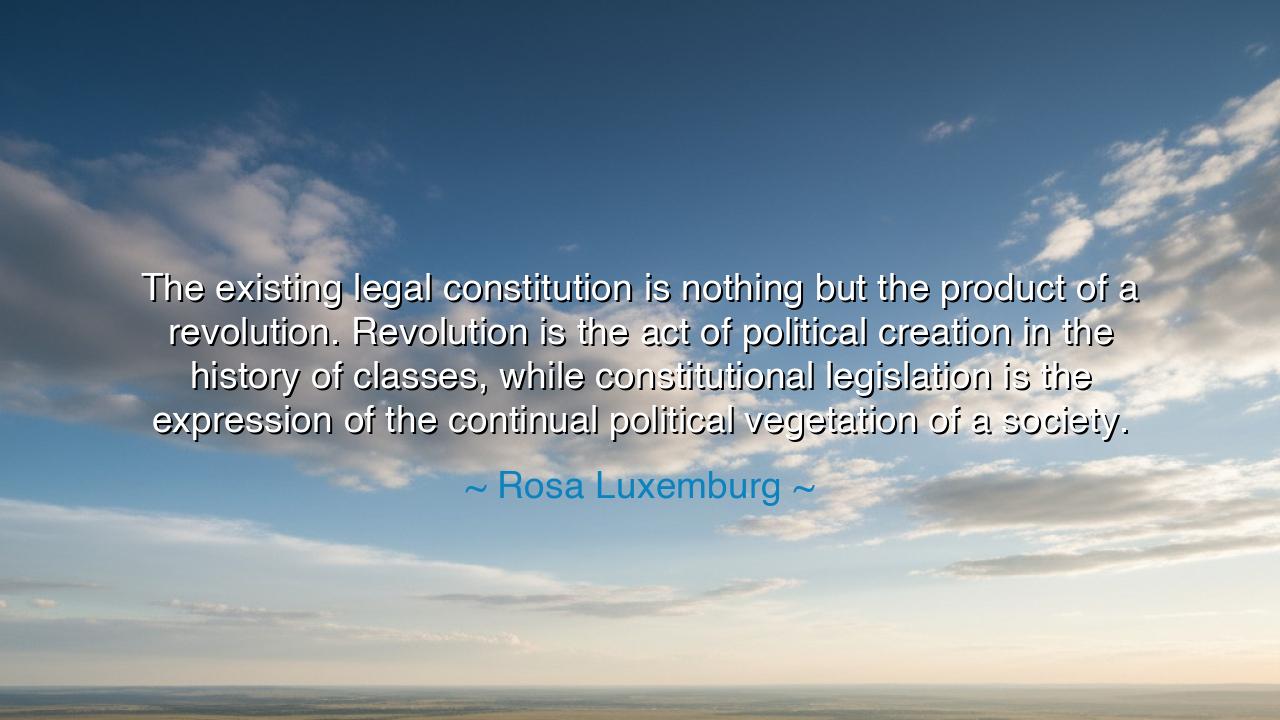
The existing legal constitution is nothing but the product of a
The existing legal constitution is nothing but the product of a revolution. Revolution is the act of political creation in the history of classes, while constitutional legislation is the expression of the continual political vegetation of a society.






Rosa Luxemburg’s words — “The existing legal constitution is nothing but the product of a revolution. Revolution is the act of political creation in the history of classes, while constitutional legislation is the expression of the continual political vegetation of a society” — thunder like a storm over the calm fields of complacency. In these lines, she reminds us that no law, no constitution, no written code of governance arises from stillness. Every legal constitution is born of upheaval, of blood and struggle, of moments when the people rise to reshape the destiny of their world. What seems permanent and peaceful today was once forged in the chaos of revolution, when human will broke the chains of habit and dared to define justice anew.
Luxemburg, a fierce revolutionary and one of the brightest minds of socialist thought, saw revolution not as an act of chaos but as the highest expression of human creativity. To her, constitutional law was merely the sediment left behind by the great current of political transformation — the river of rebellion that had already passed. A constitution, no matter how noble, is the fossilized memory of revolution. It records what was once achieved but also what has since been contained. Thus, she contrasts revolution as an act of political creation — the living fire — with legislation, which she calls political vegetation — the slow, passive growth of a society that has settled into routine.
History offers countless witnesses to her truth. When the French people stormed the Bastille in 1789, they did not act from legality, but from necessity. In that moment, the revolution became the mother of a new legal constitution, one that proclaimed liberty, equality, and fraternity. But as time passed, that constitution became encrusted with the same bureaucracies and privileges the people once overthrew. So too with every empire, every democracy, every republic — the fire of change is followed by the frost of comfort. Luxemburg warns that to worship the constitution without understanding its revolutionary roots is to mistake the ashes for the flame.
She wrote these words in defiance of those who believed progress could come only through parliaments and laws. To her, legislation was not the origin of freedom, but its echo. A society that only vegetates politically, that grows by habit and not by conviction, risks decay. When citizens become content with the mere forms of democracy — the voting, the speeches, the ceremonies — but lose the spirit of revolution, they become gardeners of a withered tree. Luxemburg calls upon us to remember that the creative power of the people, not the decrees of rulers, is the true source of justice.
Consider also the American Revolution. Before independence, colonists spoke of loyalty to a king, of laws and rights defined by a distant crown. Yet when they declared, “We hold these truths to be self-evident,” they acted not under law, but above it. That revolutionary act of political creation gave birth to a new world order — one where the governed claimed the right to govern themselves. But centuries later, even that great constitution risks becoming a relic unless its citizens remain vigilant, renewing its promise through courage and participation.
Luxemburg’s wisdom carries a warning for every age: revolutions are not once and done. When societies cease to question their laws, when they fear the disturbance of reform, they drift into spiritual vegetation. Life itself demands renewal, and politics is no different. The institutions we build must be tended not with blind reverence but with living purpose. Without that, the laws that once served freedom will become the instruments of its imprisonment.
The lesson, then, is this: cherish your revolutions, both in the streets and in the soul. Do not fear the moment when old systems crumble, for that is when humanity reclaims its authorship of destiny. Let your actions, your speech, and your conscience be part of the eternal act of creation that keeps liberty alive. And when the world grows dull with legalisms and habits, remember Rosa Luxemburg’s cry — that only through revolutionary renewal can a society continue to breathe, to grow, and to become what it was always meant to be: alive with justice and unafraid of change.






AAdministratorAdministrator
Welcome, honored guests. Please leave a comment, we will respond soon